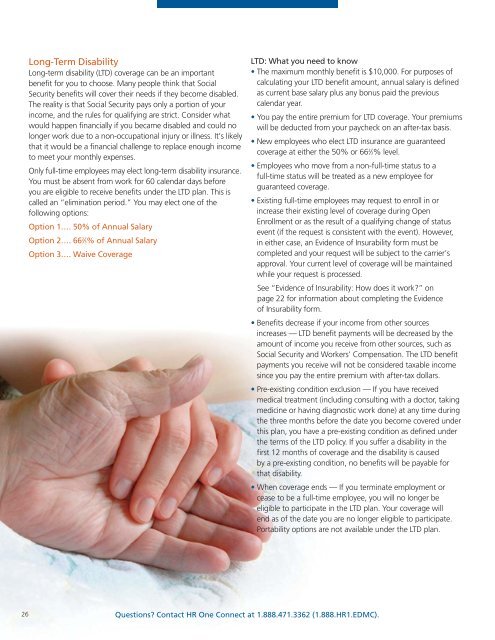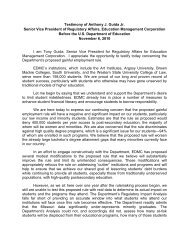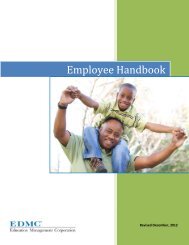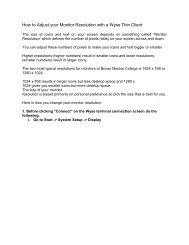2012 Benefit Enrollment Guide - Education Management Corporation
2012 Benefit Enrollment Guide - Education Management Corporation
2012 Benefit Enrollment Guide - Education Management Corporation
You also want an ePaper? Increase the reach of your titles
YUMPU automatically turns print PDFs into web optimized ePapers that Google loves.
Long-Term Disability<br />
Long-term disability (LTD) coverage can be an important<br />
benefit for you to choose. Many people think that Social<br />
Security benefits will cover their needs if they become disabled.<br />
The reality is that Social Security pays only a portion of your<br />
income, and the rules for qualifying are strict. Consider what<br />
would happen financially if you became disabled and could no<br />
longer work due to a non-occupational injury or illness. It’s likely<br />
that it would be a financial challenge to replace enough income<br />
to meet your monthly expenses.<br />
Only full-time employees may elect long-term disability insurance.<br />
You must be absent from work for 60 calendar days before<br />
you are eligible to receive benefits under the LTD plan. This is<br />
called an “elimination period.” You may elect one of the<br />
following options:<br />
Option 1…. 50% of Annual Salary<br />
Option 2…. 66 2 ⁄3% of Annual Salary<br />
Option 3…. Waive Coverage<br />
LTD: What you need to know<br />
• The maximum monthly benefit is $10,000. For purposes of<br />
calculating your LTD benefit amount, annual salary is defined<br />
as current base salary plus any bonus paid the previous<br />
calendar year.<br />
• You pay the entire premium for LTD coverage. Your premiums<br />
will be deducted from your paycheck on an after-tax basis.<br />
• New employees who elect LTD insurance are guaranteed<br />
coverage at either the 50% or 66 2 ⁄3% level.<br />
• Employees who move from a non-full-time status to a<br />
full-time status will be treated as a new employee for<br />
guaranteed coverage.<br />
• Existing full-time employees may request to enroll in or<br />
increase their existing level of coverage during Open<br />
<strong>Enrollment</strong> or as the result of a qualifying change of status<br />
event (if the request is consistent with the event). However,<br />
in either case, an Evidence of Insurability form must be<br />
completed and your request will be subject to the carrier’s<br />
approval. Your current level of coverage will be maintained<br />
while your request is processed.<br />
See “Evidence of Insurability: How does it work?” on<br />
page 22 for information about completing the Evidence<br />
of Insurability form.<br />
• <strong>Benefit</strong>s decrease if your income from other sources<br />
increases — LTD benefit payments will be decreased by the<br />
amount of income you receive from other sources, such as<br />
Social Security and Workers’ Compensation. The LTD benefit<br />
payments you receive will not be considered taxable income<br />
since you pay the entire premium with after-tax dollars.<br />
• Pre-existing condition exclusion — If you have received<br />
medical treatment (including consulting with a doctor, taking<br />
medicine or having diagnostic work done) at any time during<br />
the three months before the date you become covered under<br />
this plan, you have a pre-existing condition as defined under<br />
the terms of the LTD policy. If you suffer a disability in the<br />
first 12 months of coverage and the disability is caused<br />
by a pre-existing condition, no benefits will be payable for<br />
that disability.<br />
• When coverage ends — If you terminate employment or<br />
cease to be a full-time employee, you will no longer be<br />
eligible to participate in the LTD plan. Your coverage will<br />
end as of the date you are no longer eligible to participate.<br />
Portability options are not available under the LTD plan.<br />
26 Questions? Contact HR One Connect at 1.888.471.3362 (1.888.HR1.EDMC).









